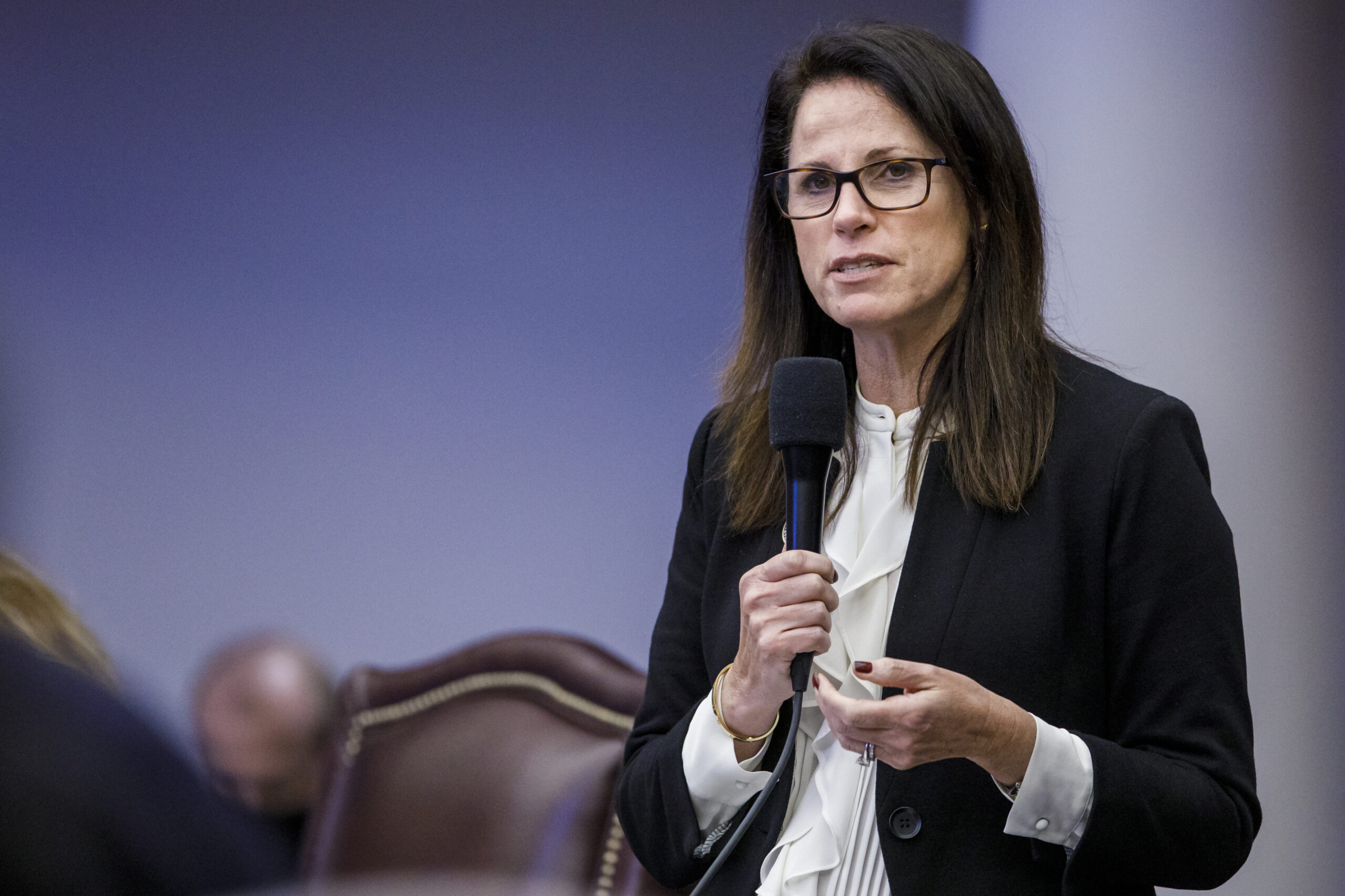Boca Raton Democratic Sen. Tina Polsky already has a fleet of bills filed for the coming Legislative Session. Their focus ranges from abortion, gun safety and medical cannabis use to property taxes, text spamming and campaign finance.
Many are re-runs, she said, because the changes they propose are still very much needed.
Atop the list is SB 288, which Polsky described as a “very mild” adjustment to Florida’s existing ban on abortion after six weeks of pregnancy.
The bill would enable abortion after six weeks if it’s necessary to prolong the woman’s life or prevent morbidity of a major body part, including “substantial impairment” to her fertility. Currently, the law allows for post-six-week abortions only to save the mother’s life or prevent “serious risk of substantial physical impairment.”
SB 288, which pends a House companion, would require only one physician to determine if a later-than-six-weeks abortion is necessary, rather than two as Florida law now mandates. It would also nix a requirement that a doctor certify their judgment in writing.
“Basically, we’re looking to expand (what constitutes) medical emergencies so doctors and hospitals can treat their patients without worrying about being sued, losing their license or going to jail,” Polsky told Florida Politics.
Polsky referenced an ad opposing Amendment 4, a failed ballot measure from last year aimed at codifying abortion protections in the Florida Constitution, which told viewers that pregnant women with life- or health-threatening medical emergencies could still be treated. In reality, she said, that hasn’t entirely been the case.
“The language in the original bill is just too restrictive. I have a constituent who bled out and had a miscarriage in a salon bathroom because the hospital turned her away. That’s not acceptable,” she said. “We’re trying to keep women from dying, as they have in Georgia and Texas. This is really a pro-life bill.”
Two related bills aimed at helping legal pot users are also on the docket.
One (SB 142), would add protections for government employees with medical use cards from termination. Oakland Park Democratic Rep. Mitch Rosenwald is carrying its House analog.
The other (SB 146) would ensure that parents with medical marijuana clearance won’t have their parental rights denied or restricted solely because they have a card.
Polsky, who practices labor and employment law, said Florida’s restrictions on medical cannabis use don’t make sense when considering federal disability laws.
“If you had to take Xanax for a mental health condition, they couldn’t fire you for that, but they can fire you for using medical marijuana for the same mental health condition. It doesn’t make sense,” she said.
The U.S. Drug Enforcement Agency still classifies marijuana as a Schedule I substance alongside heroin and considers the drug to have “no currently accepted medical use and a high potential for abuse.” Polsky said that’s a big roadblock she’s “disappointed didn’t get taken care of by the (Joe) Biden administration.
“But still, if Florida is going to maintain this medical marijuana card, then people should not have adverse employment or parental actions as a result of using something legally as long as it doesn’t affect their job or ability to parent,” she said.
Polsky is carrying several gun-related bills. They include:
— SB 256, named “Jaime’s Law” after 14-year-old Jaime Guttenberg, one of the many victims of the Feb. 14, 2018, shooting at Marjory Stoneman Douglas High School (MSD) in Parkland. The bill would apply to ammunition sales many of the same strictures currently in effect for firearms. Coral Springs Democratic Rep. Dan Daley, an MSD alum, is carrying its House twin.
— SB 252, dubbed the “Responsible Gun Ownership Act.” It would mandate universal background checks for firearm sales and transfers, strengthen safe storage standards and require every gun sold to include educational materials on responsible gun ownership and either a trigger lock or gun case. The measure would also ban the possession or manufacture of unfinished firearms without serial numbers, including so-called “ghost guns” made with a 3D printer. Democratic Rep. Christine Hunschofsky, who was the Mayor of Parkland when the MSD shooting occurred, is again sponsoring the House version.
— SB 238, to which Daley is carrying a House analog. The bill would enable local governments to pass stricter gun regulations.
— SB 254, which would expand the definition of “machine gun” to include any gun modified to fire at a faster rate. The measure, essentially, is an answer to the U.S. Supreme Court’s ruling last year to undo a ban on bump stocks effectuated during President Donald Trump’s first administration after one was used in the Oct. 1, 2017, massacre in Las Vegas.
Polsky lamented efforts by her GOP colleagues in recent years to roll back safety measures the Legislature enacted after the MSD shooting, such as a bill Palm City Republican Rep. Toby Overdorf filed this month to delete Florida’s bump stock ban from state statutes so that it’ll match federal law.
“I don’t understand this backwards trend we’re seeing,” she said. “As the Senator of Parkland, I want to do everything I can to keep that good work going and go further to keep Floridians safe”
Three more bills are high on Polsky’s to-do list. One, which she hasn’t yet filed, would remove the sunset date of a bill she and Hollywood Democratic Rep. Marie Woodson passed in 2022 to give property tax exemptions to people whose homes were damaged during a natural or man-made disaster.
The current law is set to expire in July. The update, Polsky said, would allow it to continue in perpetuity.
Another (SB 245) isn’t likely to be popular with people maddened by the seemingly nonstop political texts that went out last year. Florida cracked down two years ago with a law banning spam text messages sent to recipients who opted out of receiving them. An attractive feature in that measure was that people could sue for damages against the unwanted sender.
Polsky’s bill would exempt nonprofit organizations, including political groups and campaigns, from that liability. That was the intent of the original legislation, she said, but nonprofits have nevertheless still been taken to court, though every case has been tossed.
“Nobody likes that we were all bombarded by political campaigns, but this law wasn’t meant to affect nonprofit organizations,” she said. “I don’t want a cottage industry to start where if I can’t stand Donald Trump and he sends me a lot of texts and I try to unsubscribe and it keeps coming, I can sue him for that. Because that’s what is starting to happen.”
The last priority bill (SB 216) is one that more people are likely to get behind. It would simply provide that a state agency cannot use state funds — taxpayer dollars — to advocate for or against any matter that is the subject of a constitutional amendment or revision.
It’s Polsky’s answer to what Gov. Ron DeSantis’ administration did last year by leveraging state resources and funds to defeat a pair of constitutional amendments meant to guarantee abortion access and legalize recreational marijuana.
“I am so disgusted by how much state money was spent for political purposes,” she said.
The regular 2025 Legislative Session commences March 4 and runs through May 2.
Post Views: 0

 Entertainment8 years ago
Entertainment8 years ago
 Entertainment8 years ago
Entertainment8 years ago
 Politics8 years ago
Politics8 years ago
 Tech8 years ago
Tech8 years ago
 Tech8 years ago
Tech8 years ago
 Politics8 years ago
Politics8 years ago
 Tech8 years ago
Tech8 years ago
 Tech8 years ago
Tech8 years ago










